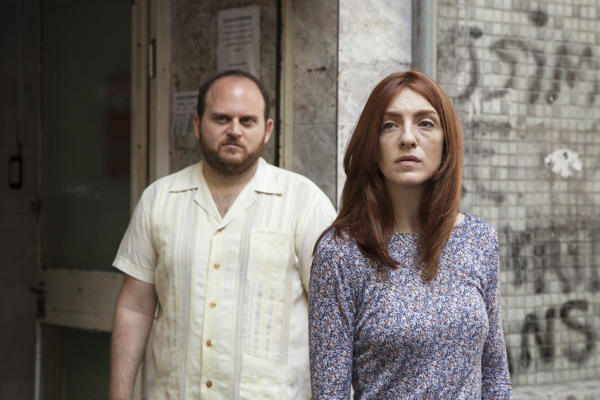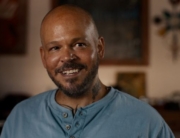Argentinian writer/director Daniel Burman has been known internationally for his warmly humanistic looks at the interplay of adult children and parents ever since his first widely distributed film Lost Embrace (2004). While the families got older and more traveled away from Buenos Aires, such as in Family Law (2006) and Empty Nest (2008), The Tenth Man features an adult prodigal son returning home from New York City to the old Jewish neighborhood known as El Once (“the Eleventh” in Spanish, for the September 11, 1852 Plaza).
Burman really did get a call exactly like the one his main character, Ariel (Alan Sabbagh), receives in the opening scene: “Buy a pair of size 47 sneakers with Velcro. For a boy in the hospital.” The call is from Usher Barilka, who runs Fundación Pele Ioetz, a Jewish aid foundation in El Once. Burman met Usher when he got his permission to join their annual Orthodox pilgrimage to famous graves in Eastern Europe, which he filmed in the documentary 36 Righteous Ones (2011). The documentary feel continues through this new feature that blends fiction into a lot of reality. Here, Ariel is Usher’s fictional son, who keeps getting calls from his father, played by the real Usher, when he comes back to Argentina alone after his girlfriend bails to pursue her own career. Just like Burman in real life, Ariel brings back the wrong shoes.
The phone call immediately flashes Ariel back to the roots of his longtime estrangement from his father. After his mother left their apartment and its Orthodox Jewish regulations, he, as a child, expected more attention from his father, especially when he had a special role in a school assembly. But all it took was a call that “the tenth man” was needed to make a minyan (the minimum to conduct a prayer service), and Usher would leave.
Back in El Once, Ariel immediately plunges into his Jewish roots. Walking past old synagogues and a memorial mural to the 85 people killed in the terrorist attack there on July 18, 1994, the busy commercial streets and crowded sidewalks resemble New York’s Lower East Side of the past. The biggest crowd is pushing in front of the foundation’s headquarters—and they’re mad. The happy holiday of Purim is coming up at the end of the week, and there’s no meat for the poor who are dependent on the charity.
Ariel’s Aunt Susy (Elvira Onetto) pulls him into the organized chaos of the real charity, where volunteers (most of them non-actors) sort through towering boxes and bags of donated and salvaged goods of every possible type (half-full medicine boxes, wigs, party paraphernalia, unexpired cell phones, and more), matching them with any requests of the needy in an elaborate roundelay of barter for items and services (“Who owes us a favor?” is a phrase they ask). He immediately gets another call from Usher with a directive—go and empty out the late Mr. Goldstein’s apartment before his phone and pills expire.
Day-by-day over the course of a week, Usher keeps calling with more instructions: first go to the family home, where his father left him his childhood treat and T-shirts, and then the next day go and take those requested sneakers to the ill young man in the hospital. Both Usher and his aunt keep telling Ariel to do his errands with “the girl,” the pretty young Orthodox woman Eva (Julieta Zylberberg), who has taken a repentant vow of silence. Her muteness allows Ariel to talk on and on, about how he had rebelled so much against his father’s “inexplicable generosity” that he became an economist (according to the English subtitles, though Spanish speakers translate his profession as “businessman”). He complains to Eva that this charitable impulse is suspicious. “The way I see it, people do things to get something in return,” he says. “I give this, you give me something better in return. You people make the economic theory collapse.” In exchange, she offers him a delicious dinner.
Besides Ariel becoming more and more comfortable back in the old neighborhood, as well as with Eva and in the religious rituals he had ignored (Sabbagh’s whole body language changes along with the days of the week), there is a bit more to the story. Eva’s silence is amusingly related to the meat shortage crisis, since her father is the kosher butcher, furious that she’s working and living at the foundation.
In addition to finally getting to reunite with Usher, there is a panoply of delightful characters, whether through their dialogue or through the visuals, such as the faces of the poor elderly who are sustained by the weekly free Shabbat dinner and entertainment. Cinematographer Daniel Ortega’s documentary-like hand-held camera glides around rooms, crowded stores, and sidewalks, then swings up and looks on from a distance as Ariel walks alone down deserted streets after-hours.
The original title El rey del Once (“King of Once”) well evokes a closing scene as Ariel smiles and dons a costume crown to join in the community’s celebration of Purim, when Jews get seriously drunk with sincere happiness. You, too, will leave with a smile.







Leave A Comment